When we think about Syria, two things come to mind. One, Mesopotamia, the cradle of civilization. The other, the Mitanni-Hittite treaty found in Boghazkoi. In fact, no discussion about ancient Indian history is ever complete without this treaty. This region worshipped goddess Astarte .It is here that the fierce queen Zenobia once ruled. What if I told you that the old Mesopotamia has a new kingdom? A kingdom where men and women are equals? Where the flora and fauna are protected. That it is a nation of braided queens who fight for democratic rights with the patriarchal ISIS and Turks. They are fighting to shrug off the of Arab supremacy? That these modern Amazons have written the first Feminist Constitution of the world. The people of Rojava cantons, the autonomous regions of Afrin , Jazira and Kobane, in Syria have enacted a Social Contract. But at first, lets begin at the beginning.
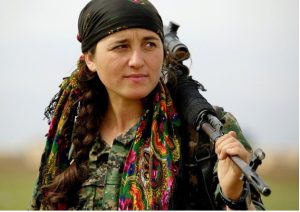 Rojava revolution is a story of modern Amazons. The present crisis started in the year 2011. Sunni-dominated opposition that included various factions of Syrian army backed by various jihadist groups wanted to replace president Bashar al- Assad and its Syrian Arab Republic. Thus the Syrian civil war began. The Northern swath, under the control of Democratic front of Northern Syria with its armed wing SDF, remained engaged in a bitter war against the fundamentalist ISIS. The situation got further complicated with the participation of USA , Russia , European Union and Turkey. Air-strikes and use of chemical weapons became the order of the day. The weakened Syrian regime paved the way for autonomy in the northern mountains bordering Turkey. Three Kurd-majority regions Afrin, Jazira and Kobane declared autonomy. The persecuted minority Kurds from the neighbouring Turkey came to the region which had come to be called Rojava. The Kurdish female warriors alongside SDF fought the ISIS successfully. But eventually the US abandoned the Kurds against the Turkish offensive. With the fall of Afrin IN 2018, The Rojava experiment is in danger.
Rojava revolution is a story of modern Amazons. The present crisis started in the year 2011. Sunni-dominated opposition that included various factions of Syrian army backed by various jihadist groups wanted to replace president Bashar al- Assad and its Syrian Arab Republic. Thus the Syrian civil war began. The Northern swath, under the control of Democratic front of Northern Syria with its armed wing SDF, remained engaged in a bitter war against the fundamentalist ISIS. The situation got further complicated with the participation of USA , Russia , European Union and Turkey. Air-strikes and use of chemical weapons became the order of the day. The weakened Syrian regime paved the way for autonomy in the northern mountains bordering Turkey. Three Kurd-majority regions Afrin, Jazira and Kobane declared autonomy. The persecuted minority Kurds from the neighbouring Turkey came to the region which had come to be called Rojava. The Kurdish female warriors alongside SDF fought the ISIS successfully. But eventually the US abandoned the Kurds against the Turkish offensive. With the fall of Afrin IN 2018, The Rojava experiment is in danger.
In the year 2014, Rojava, ‘the land of the setting sun’, adopted their Constitution. In the preamble as well as in the charter itself, they have mentioned each and every community, be it a religious or linguistic one. It is a confederation of Kurds, Arabs, Assyrians (Assyrian Chaldeans, Arameans), Turkmen, Armenians and Chechens. Their founding principles are Freedom, Justice, Dignity and democracy: “In pursuit of freedom, justice, dignity and democracy and led by principles of equality and sustainability”. One of the most important principles is probably the mention of ‘environmental sustainability’. It is a rare Constitution which gives equal importance to Social Ecology as well as Environmental Ecology. In their preamble they also affirm the peoples’ right to self-determination. This signals the paradigm shift in the Kurdish movement .It has moved from national liberation to democratic confederalism. The charter is ‘freely and solemnly’” drawn up .There is another important provision which has never been uttered in that region. They are in the process of establishing a society “ free from authoritarianism, militarism, centralism, and intervention of religious authority in public affairs”—In a region where sectarian conflict is the norm of the day, and religious and ethnic cleansing is part of the polity, these people who have been at the receiving end of violence and persecution for centuries, are forming a polity based on secular principles.
 “Rojava is among a few places in the world which has implemented a thoroughly radical program of utopian autonomy and has made possible the creation of an alternative inside that remains outside of the nation-state”[1] “In establishing this charter, we declare a political system and civil administration founded upon a social contract that reconciles the rich mosaic of Syria through a transitional phase from dictatorship , civil war and destruction, to a new democratic society where civic life and social justice are preserved”. This confederation is facing the fire from Turkey where President Erdogan is almost establishing an Islamic Caliphate, it has matched its fighting prowess with the ISIS and made them backtrack, and has been used as a pawn in the games of Iran’s Shadow Commander Sulaimani in his ambition for creating and maintaining Shia’ite influence in the region of Sunni-majority Syria. As Kurds have been one of the most persecuted communities in the region encompassing Syria, Iraq and Turkey, when the Kurds fight , they do not fight in a vacuum.“ The YPJ fight, for instance, because she is fighting for herself, but also for thousands of other women like herself who has faced daily facts of silencing, shame and oppression. She fights within the society, but also towards external forces such as capitalism or patriarchy expressed through ISIS for instance.Her burden is double,but informed by a complex understanding of history, identity, capitalism and patriarchy.[2] The General Principles declares that ‘ democratic principles are essential to a ‘ free’ society. This charter also stresses upon decentralization and pluralism. It constitutionally affirms the co-existing brotherhood of the ethnic and religious communities and all shall be represented in the Legislative Assembly. ‘ All persons and communities are equal in the eyes of the law and in rights and responsibilities”( Article 6) .
“Rojava is among a few places in the world which has implemented a thoroughly radical program of utopian autonomy and has made possible the creation of an alternative inside that remains outside of the nation-state”[1] “In establishing this charter, we declare a political system and civil administration founded upon a social contract that reconciles the rich mosaic of Syria through a transitional phase from dictatorship , civil war and destruction, to a new democratic society where civic life and social justice are preserved”. This confederation is facing the fire from Turkey where President Erdogan is almost establishing an Islamic Caliphate, it has matched its fighting prowess with the ISIS and made them backtrack, and has been used as a pawn in the games of Iran’s Shadow Commander Sulaimani in his ambition for creating and maintaining Shia’ite influence in the region of Sunni-majority Syria. As Kurds have been one of the most persecuted communities in the region encompassing Syria, Iraq and Turkey, when the Kurds fight , they do not fight in a vacuum.“ The YPJ fight, for instance, because she is fighting for herself, but also for thousands of other women like herself who has faced daily facts of silencing, shame and oppression. She fights within the society, but also towards external forces such as capitalism or patriarchy expressed through ISIS for instance.Her burden is double,but informed by a complex understanding of history, identity, capitalism and patriarchy.[2] The General Principles declares that ‘ democratic principles are essential to a ‘ free’ society. This charter also stresses upon decentralization and pluralism. It constitutionally affirms the co-existing brotherhood of the ethnic and religious communities and all shall be represented in the Legislative Assembly. ‘ All persons and communities are equal in the eyes of the law and in rights and responsibilities”( Article 6) .
Rojava Constitution has three pillars: direct democracy, feminism and social ecology. “Social ecology is the conviction that nearly all of our present ecological problems originate in deep-seated social problems. It follows, from this view, that these ecological problems cannot be understood, let alone solved, without a careful understanding of our existing society and the irrationalities that dominate it. To make this point more concrete: economic, ethnic, cultural, and gender conflicts, among many others, lie at the core of the most serious ecological dislocations we face today – apart, to be sure, from those that are produced by natural catastrophes. If this approach seem.[3]2 Article 42 States that ‘The economic system in the provinces shall be directed at providing general welfare and in particular granting funding to science and technology. It shall be aimed at guaranteeing the daily needs of people and to ensure a dignified life. Monopoly is prohibited by law. Labor rights and sustainable development are guaranteed.” This Article , along with the provision of Article 90, “The Charter guarantees the protection of the environment and regards the sustainable development of natural ecosystems as a moral and a sacred national duty,” merges Environmental Ecology with Social Ecology.
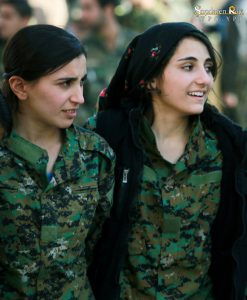 Rojava has introduced grassroots democracy. According to Article 8, “All Cantons in the Autonomous Regions are founded upon the principle of local self-government. Cantons may freely elect their representatives and representative bodies, and may pursue their rights insofar as it does not contravene the articles of the Charter.” Kurds have been denied their right to language in both Syria and Iraq. The Charter declares that All communities , Kurdish, Arabic and Syriac shall have the right to teach and be taught in their native language. In the Basic Principles chapter of the Charter, Article 14 ensures redressal for chauvinistic and discriminatory State policies. Article 24 states, ‘Everyone has the right to freedom of opinion and expression; including freedom to hold opinions without interference and to seek, receive and impart information and ideas through any media and regardless of frontiers.’ Article 23 is one of the cornerstones for an equitable society. It establishes gender equality and ecological balance. Provision a states: Everyone has the right to express their ethnic, cultural, linguistic and gender rights .Provision b sates: Everyone has the right to live in a healthy environment, based on ecological balance. The Kurdish children have , for ages, been denied the right to education . Article 91of the charter provides , “The education system of the Autonomous Regions shall be based upon the values of reconciliation, dignity, and pluralism.’This creates an atmosphere free from racist and chauvinistic principles.
Rojava has introduced grassroots democracy. According to Article 8, “All Cantons in the Autonomous Regions are founded upon the principle of local self-government. Cantons may freely elect their representatives and representative bodies, and may pursue their rights insofar as it does not contravene the articles of the Charter.” Kurds have been denied their right to language in both Syria and Iraq. The Charter declares that All communities , Kurdish, Arabic and Syriac shall have the right to teach and be taught in their native language. In the Basic Principles chapter of the Charter, Article 14 ensures redressal for chauvinistic and discriminatory State policies. Article 24 states, ‘Everyone has the right to freedom of opinion and expression; including freedom to hold opinions without interference and to seek, receive and impart information and ideas through any media and regardless of frontiers.’ Article 23 is one of the cornerstones for an equitable society. It establishes gender equality and ecological balance. Provision a states: Everyone has the right to express their ethnic, cultural, linguistic and gender rights .Provision b sates: Everyone has the right to live in a healthy environment, based on ecological balance. The Kurdish children have , for ages, been denied the right to education . Article 91of the charter provides , “The education system of the Autonomous Regions shall be based upon the values of reconciliation, dignity, and pluralism.’This creates an atmosphere free from racist and chauvinistic principles.
 Taking together Article 23, Article 27 and article 28, the charter becomes the world’s first ever Feminist Constitution. Article 27 says, “Women have the inviolable right to participate in political, social, economic and cultural life.” Article 28 states, “Men and women are equal in the eyes of the law. The Charter guarantees the effective realization of equality of women and mandates public institutions to work towards the elimination of gender discrimination.” The charter also provides for the Legislative Assembly being composed of at least forty per cent of either sex according to the electoral laws and all public posts being co-chaired by both genders. Article 87 states, ‘All governing bodies, institutions and committees shall be made up of at least forty percent of either sex .
Taking together Article 23, Article 27 and article 28, the charter becomes the world’s first ever Feminist Constitution. Article 27 says, “Women have the inviolable right to participate in political, social, economic and cultural life.” Article 28 states, “Men and women are equal in the eyes of the law. The Charter guarantees the effective realization of equality of women and mandates public institutions to work towards the elimination of gender discrimination.” The charter also provides for the Legislative Assembly being composed of at least forty per cent of either sex according to the electoral laws and all public posts being co-chaired by both genders. Article 87 states, ‘All governing bodies, institutions and committees shall be made up of at least forty percent of either sex .
“Article 27 says, “Women have the inviolable right to participate in poltical, social. Economic and cultural life”. And the YPJ come to mind, with their courage and strength, carrying weapons heavier than themselves and their deceptively small statures which fail to hide their capacity to challenge 1000s of years of patriarchy in a stroke of immense infinity of women’s power that continues to smash our understanding of gender.”(Hawzhin azeez).Hawzhin Azeez also points out,“One of the greatest aspects of Rojava’s Revolution and its brilliant, ingenious, radical view of society comes through the active, deliberate and revolutionary utilization of all women, including older women; Older women, mothers and grandmothers who actively participate and carry on the revolution. They lead protests and marches. They lead the protection of their communities… “[4]. The Rojava way of gender equality probably is an echo of the ancient world where goddesses and queens had ruled for years . It as much owing to the fact that the incarcerated Kurdish leader and theoretician Abdullah Ocalan has reiterated that women’s freedom is one of the most important characterisatics of a democratic nation and he believes that without women, a society can not be free.( SAGE JOURNAL) [5] .” Not to forget that this constitution has been written under the shadow of ongoing War and and Death ” Yet it proves to be an important discourse on feminism and its implementation in public life.
The charter has also called for the law’s protection equally for all religion, and its acceptance of the diversity of culture and religion is in stark contrast with the Syrian constitution, and for that matter, Pan-Arabism. Let’s take a look at what the Syrian Constitution says in its Preamble,‘ The Syrian Arab Republic is proud of its Arab identity and the fact that its people are an integral part of the Arab nation. The Syrian Arab Republic embodies this belonging in its national and pan–Arab project and the work to support Arab cooperation in order to promote integration and achieve the unity of the Arab nation.’ In the chapter of Political Principles it declares that, the Syrian Arab Republic is a democratic state with full sovereignty, indivisible, And may not waive any part of its territory, and is part of the Arab homeland .The people of Syria are part of the Arab nation’. The official language of the state is Arabic .The political principle also states that the religion of the President of the Republic is Islam. Islamic jurisprudence shall be a major source of legislation.(Constitution of the Syrian Arab Republic-2012)[6]If we compare this with the Rojava doctrine, Article 92 states firmly, ‘ The charter enshrines the principle of separation of religion and state. The charter states that religion is a private affair. This principle is the difference personified between the politics of the sectarian Middle East and Rojava.‘Everyone has the right to freedom of worship, to practice one’s own religion either individually or in association with others ( Art. 31). No one shall be subjected to persecution on the grounds of their religious beliefs. The right to freedom of association, political, economic and cultural expression of all communities is protected ( Art. 32 (b)). The writers of the social contract know very well the kind of polity they are aiming at as they further state the aforesaid provision aimed at protect the rich and diverse heritage of the people. The official languages include Kurdish, Arabic and Syriac. That it is a constitution based fundamentally on Rule of Law is further elaborated as Art. 92 stresses that the right to exercise religious beliefs shall be guaranteed, insofar as it does not adversely affect the public good.
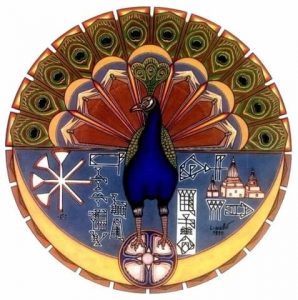 One of the most important provisions of the charter is the provision for protection of the Yazdi people .The Charter states: ‘The Yazidi religion is a recognized religion and its adherents’ rights to freedom of association and expression is explicitly protected. The protection of Yazidi religious, social and cultural life may be guaranteed through the passage of laws by the Legislative Assembly.’ If we take a deeper look at the Yazdi question, we may safely title it, ‘The curious case of the Yazdi’. The Yazdis share many similarities with the Indians. They worship Peacock angel Tawuse Malek which bears the distant echo of Kartikeya, the Indian warrior God. Peacock is native to the Indian sub-continent. They believe in the transmigration of the soul, just like the Indians. Sri Sanjeev Sanyal, in his book, Land of Seven Rivers: History of India’s Geography’ observes that,’ like Hindus, the Yazdis, believe in reincarnation and avatars…’ He also writes,’ …they pray facing the sun at dawn and dusk and have a system of endogamous castes.’ Sanyal further highlights, ‘ indeed the yezdi themselves have a tradition that they came to the middle east from India about 4,000 years ago-around when the mature Harappan civilization would have begun to disintegrate…’ In ‘peacock angel: being some account of the votaries of a secret cult and their sanctuaries,’ British anthropologist Ethel Drower describes her conversation with a Yazdi bard,’ ‘We qawwals travel ,and meet people of all races and religions. We used to take the sanjak (bronze image of the sacred peacock) as far as Russia and India..’ Dr Subhas Kak points out, ‘ the word Yazdi is cognate with Sanskrit Yajata.’ They are one of the most persecuted communities in world as they have been branded as devil-worshippers by both their Christian and Muslim neighbours in the Middle east.( this may have to do with the Zarathusrtian tradition of worshiping Asura).
One of the most important provisions of the charter is the provision for protection of the Yazdi people .The Charter states: ‘The Yazidi religion is a recognized religion and its adherents’ rights to freedom of association and expression is explicitly protected. The protection of Yazidi religious, social and cultural life may be guaranteed through the passage of laws by the Legislative Assembly.’ If we take a deeper look at the Yazdi question, we may safely title it, ‘The curious case of the Yazdi’. The Yazdis share many similarities with the Indians. They worship Peacock angel Tawuse Malek which bears the distant echo of Kartikeya, the Indian warrior God. Peacock is native to the Indian sub-continent. They believe in the transmigration of the soul, just like the Indians. Sri Sanjeev Sanyal, in his book, Land of Seven Rivers: History of India’s Geography’ observes that,’ like Hindus, the Yazdis, believe in reincarnation and avatars…’ He also writes,’ …they pray facing the sun at dawn and dusk and have a system of endogamous castes.’ Sanyal further highlights, ‘ indeed the yezdi themselves have a tradition that they came to the middle east from India about 4,000 years ago-around when the mature Harappan civilization would have begun to disintegrate…’ In ‘peacock angel: being some account of the votaries of a secret cult and their sanctuaries,’ British anthropologist Ethel Drower describes her conversation with a Yazdi bard,’ ‘We qawwals travel ,and meet people of all races and religions. We used to take the sanjak (bronze image of the sacred peacock) as far as Russia and India..’ Dr Subhas Kak points out, ‘ the word Yazdi is cognate with Sanskrit Yajata.’ They are one of the most persecuted communities in world as they have been branded as devil-worshippers by both their Christian and Muslim neighbours in the Middle east.( this may have to do with the Zarathusrtian tradition of worshiping Asura).
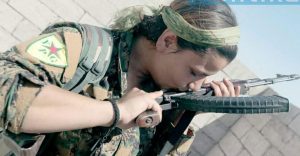 But let us get back to the social contract and its implications. It invokes the principles of gender equality and protection of ecology. In the geo political scenario prevailing in an area where Iran , Turkey , Russia, US —all have vested interests, and imperialistic designs, Rojava is almost an Utopia, except for the fact that it is real. As Thomas Schmidinger has pointed out in his book ‘The battle for the mountain of the kurds: self determination and ethnic cleansing in the Afrin region of Rojava’,2019 PM PRWSS),[7] that Syrian Rojava is based on democratic principles and co-existence of multiple ethnicities. He has also noted that the European press has seldom given credit to the Kurdish women’s militia. He also notes that even the leftist scholars have ignored the anti-fascist role of the Rojava Revolution. The Rojava system of ecological councils goes unnoticed too by the press.*A spiral of silence dominates the world’s media as an equal society in all intents and purposes reclaims their ancient lineage. The Western bias for the exotic East is not prepared to splash their papers with the image of frail and beautiful women dancing, weapons lining their shoulders like some divine girdle, to celebrate the fall of ISIS. Rojava constitutes one-third of Syria’s land mass, and is home to 2 million people., Not a very negligible people in term of numbers. **The montage of Gal Gadot’s princess Diana jumping into the fray in the second world war creates a powerful image of the Amazons in the film Wonder Woman , released in 2017. But a revolution of the women started much before that, gets unnoticed and deliberately too. This is what we may term as the “ Image-poltics” of Western media. The First World survives on selling the submissive women of the East, completely ignoring the very contemporary fact of the grooming of western women by Arab Islamists in the West, and white supremacist males’ dominance Arguably the world’s most powerful state has not been able to elect a female president till date. It is easier for the hand-maiden of the Western powers, of both Europe and America, to publish the heartbreaking photograph of the dead Syrian child. But it goes against their interests to highlight the very real pictures of the Kurdish female fighters. Besides the Image -Politics of the Western Media , the Rojava question involves the oil interests of the various powers, the hold over the natural resources. The basic tenets of corporate greed and profit-oriented western economy and Pan-Arabism go against the core principle of equality enshrined in the Rojava Charter.
But let us get back to the social contract and its implications. It invokes the principles of gender equality and protection of ecology. In the geo political scenario prevailing in an area where Iran , Turkey , Russia, US —all have vested interests, and imperialistic designs, Rojava is almost an Utopia, except for the fact that it is real. As Thomas Schmidinger has pointed out in his book ‘The battle for the mountain of the kurds: self determination and ethnic cleansing in the Afrin region of Rojava’,2019 PM PRWSS),[7] that Syrian Rojava is based on democratic principles and co-existence of multiple ethnicities. He has also noted that the European press has seldom given credit to the Kurdish women’s militia. He also notes that even the leftist scholars have ignored the anti-fascist role of the Rojava Revolution. The Rojava system of ecological councils goes unnoticed too by the press.*A spiral of silence dominates the world’s media as an equal society in all intents and purposes reclaims their ancient lineage. The Western bias for the exotic East is not prepared to splash their papers with the image of frail and beautiful women dancing, weapons lining their shoulders like some divine girdle, to celebrate the fall of ISIS. Rojava constitutes one-third of Syria’s land mass, and is home to 2 million people., Not a very negligible people in term of numbers. **The montage of Gal Gadot’s princess Diana jumping into the fray in the second world war creates a powerful image of the Amazons in the film Wonder Woman , released in 2017. But a revolution of the women started much before that, gets unnoticed and deliberately too. This is what we may term as the “ Image-poltics” of Western media. The First World survives on selling the submissive women of the East, completely ignoring the very contemporary fact of the grooming of western women by Arab Islamists in the West, and white supremacist males’ dominance Arguably the world’s most powerful state has not been able to elect a female president till date. It is easier for the hand-maiden of the Western powers, of both Europe and America, to publish the heartbreaking photograph of the dead Syrian child. But it goes against their interests to highlight the very real pictures of the Kurdish female fighters. Besides the Image -Politics of the Western Media , the Rojava question involves the oil interests of the various powers, the hold over the natural resources. The basic tenets of corporate greed and profit-oriented western economy and Pan-Arabism go against the core principle of equality enshrined in the Rojava Charter.
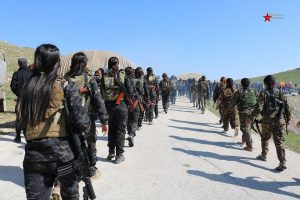 The mainstream media’s role in the Rojava crisis is a rude example of a conscious politico-communication stand against self–identity of the persecuted communities who have decided to survive on cooperation and not on greed. Operation Peace Spring and Operation Olive Branch launched with a vehemence by the Turkish regime in the region is a threat no doubt, the settling of Chinese Ulyghurs and Syrian refugees in Turkey in the Kurdistan too is a threat. But more ominous is the absence of a defining image of the Rojava crisis in the media. The alternative communication modes like blog is doing what the mainstream media, has apparently forgotten to do, i.e. highlighting a humanitarian crisis in the region.
The mainstream media’s role in the Rojava crisis is a rude example of a conscious politico-communication stand against self–identity of the persecuted communities who have decided to survive on cooperation and not on greed. Operation Peace Spring and Operation Olive Branch launched with a vehemence by the Turkish regime in the region is a threat no doubt, the settling of Chinese Ulyghurs and Syrian refugees in Turkey in the Kurdistan too is a threat. But more ominous is the absence of a defining image of the Rojava crisis in the media. The alternative communication modes like blog is doing what the mainstream media, has apparently forgotten to do, i.e. highlighting a humanitarian crisis in the region.
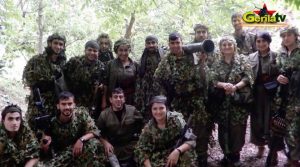 If the Mitanni treaty gives us a glimpse of what the past was like, the Social Charter of Rojava gives us a glimpse of what the future can be. With its ideal of social ecology , it is a rare endevour in the modern history of mankind. As Turkey bombed the 3,000 year old neo-Hittite Ain Dara temple ( built in around 1300 BC) in the year 2018, It was not a mere destruction of almost sixty percent of the temple complex, it was a stand. A patriarchal stand against the rise of the goddess. Goddess Astarte and her progeny. The Antiquities ministry of the Syrian government spoke the truth when it stated, ‘ This attack reflects the hatred and barbarism of the Turkish regime against the Syrian identity and against the past, present and future of the Syrian people[8] The Rojava Experiment is political feminism in real time. This is the only time that Feminism came closer to affirmative action to replace the agitation mode in public sphere.This could be the foremost agenda in public discourse. The sacred feminine of Middle East has arisen, with the roar of a lioness, in the mountains. It is the first temple, it is the ‘ First colony of feminism”. With the fall of Afrin and change of demography in the region pushed by Turkey and Russia, only Time will tell whether it will be the last roar of the lioness.
If the Mitanni treaty gives us a glimpse of what the past was like, the Social Charter of Rojava gives us a glimpse of what the future can be. With its ideal of social ecology , it is a rare endevour in the modern history of mankind. As Turkey bombed the 3,000 year old neo-Hittite Ain Dara temple ( built in around 1300 BC) in the year 2018, It was not a mere destruction of almost sixty percent of the temple complex, it was a stand. A patriarchal stand against the rise of the goddess. Goddess Astarte and her progeny. The Antiquities ministry of the Syrian government spoke the truth when it stated, ‘ This attack reflects the hatred and barbarism of the Turkish regime against the Syrian identity and against the past, present and future of the Syrian people[8] The Rojava Experiment is political feminism in real time. This is the only time that Feminism came closer to affirmative action to replace the agitation mode in public sphere.This could be the foremost agenda in public discourse. The sacred feminine of Middle East has arisen, with the roar of a lioness, in the mountains. It is the first temple, it is the ‘ First colony of feminism”. With the fall of Afrin and change of demography in the region pushed by Turkey and Russia, only Time will tell whether it will be the last roar of the lioness.
[1] (SAGE Journal “ From national liberation to radical democracy: Exploring the shift in the Kurdish liberation movement in Turkey “ by Simin Fadaee, Camilla Brancolini, first published February12, 2019))
[2] .”(“ On oppression, Liberation, and Decolonization of Revolutionary Struggles: An interview with Dr. Hawzhin azeez. By Katarina Pavicic-Ivella.itsgoingdown.org)
[3] (Murray BOOKCHIN . Social ecology and communalism. AK press, first printing.2007)
[4] (Hawzhin. Press ,Hawzhin azeez)
[5] [5](SAGE Journal “ From national liberation to radical democracy: Exploring the shift in the Kurdish liberation movement in Turkey “ by Simin Fadaee, Camilla Brancolini, first published February12, 2019)) 3
[6] Syrian Constitution
[7] Thomas Schmidinger, Andrej Grubacic(The battle for the mounatin of the KURDS: self determination and ethnic cleansing in the Afrin region of Rojava,2019 PM PRWSS)
[8] .”(The Telegraph, 29 january, 2018)
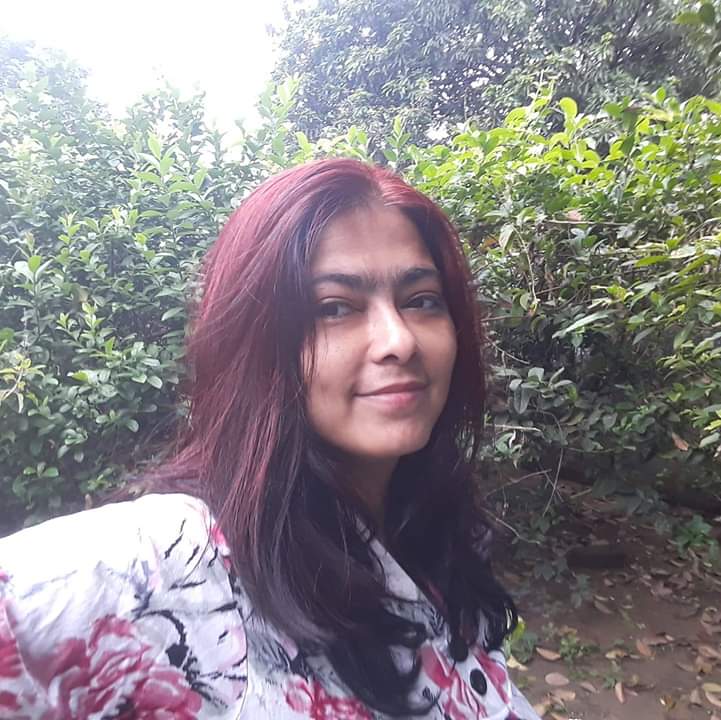
Dr. Anuja Bagchi is a sincere teacher and a voracious reader. Her fields of interest are Law and Journalism and Mass Communication.



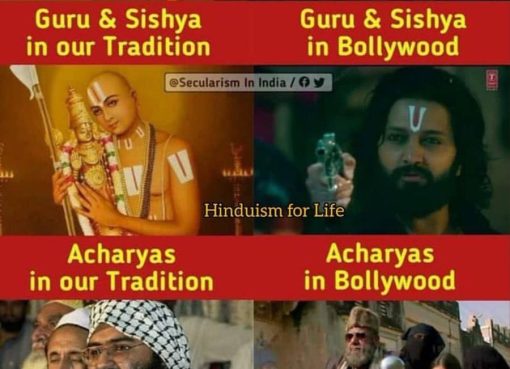
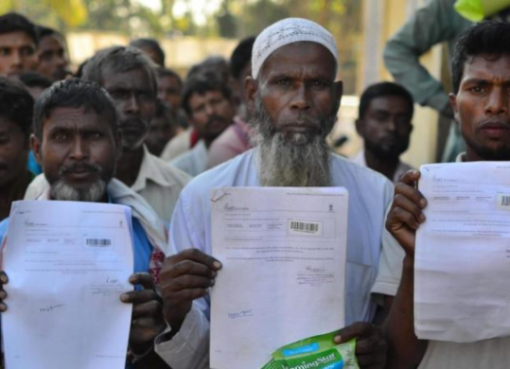

Comment here